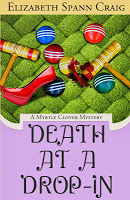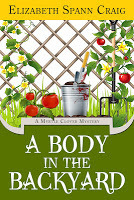Riley Adams's Blog, page 150
August 13, 2013
Release Activities for the Reluctant Promoter
by Elizabeth S. Craig, @elizabethscraig

This year, I will have at least
four, maybe five (the fifth will be pushing it) releases. Three are traditionally published, I’ve
got one new self-pub release, and there's one that’s waiting in the wings.
Somehow, though, despite all
the releases, I freeze up when it’s launch day.
You’d think I’d never had a release in my life. I really have no idea
why I do this, but I’m now coming up with a handy-dandy cheat sheet for me so
that I can refer to this post when I freeze up again…which will likely happen
with the December Penguin release.
After I get the formatted files
back from my formatter (thanks Rik Hall), or
after the traditional press book launches, I need to:
For self-pub books:
Upload to Smashwords.
Upload to Nook.
Upload to Kindle.
Upload to CreateSpace.
Check my emails or the
individual platform sites to see how the review processes are going for
CreateSpace and Smashwords.
When CreateSpace approves my
content, I need to order proof copies (yes, I actually like to see the physical book and make sure the cover fits.)
Make sure Smashwords isn’t
having any issues with my upload. Fix any issues that arise.
Check on Nook’s progress. Nook is poky.
By this time, Amazon will
already be live. Use the Amazon link to
claim my book on ACX (the audiobook platform).
Send email to ACX asking them for a stipend for the narrator (and
referencing the other books in the series.)
For self-pub and trad. pub:
Update my website that I have a
new book available. Paste in the Amazon
buy-link (at that point, the only one ready to go.)
Post the release on my two
business-related Facebook accounts (I’ve got two names I write under.) I skip posting about the release on my
personal Facebook account…I’ve got so many annual releases that I think my friends
and family would be heartily sick of hearing about them. At least I’m gearing to readers on my other
accounts. I only post once on the
release on the business Facebooks, to avoid overkill.
I don’t tweet the release on
Twitter. But I will link to this post,
which will increase awareness indirectly.
Update my Amazon Author
page. Add the new book to my list of
books.
Update Goodreads.
Update various bios and avatar
bios. Lately, I haven’t done this—I’ve just listed on the bios that I have 3
series and to visit my website (it’s just time-consuming).
For self-pub:
Are any of the other buy links
live? Nook? Smashwords? Add those to my website.
Look over my proof from
CreateSpace.
Once I’ve got CreateSpace live,
order copies for a Goodreads giveaway.
Link to the giveaway on my website.
Actually, I should really list the giveaway months before the print release,
then provide the giveaway copies once they’re available.
Check on progress of auditions
for narrators at ACX. Choose narrator
for project.
For Self-pub and trad. pub:
If you were a
smart author and had a mailing list for your newsletter…you should send out a
newsletter on the release. No comment as to whether I’m a smart author or
not. :(
Write blog posts
for blog tour. If you were smart and are
doing a blog tour. No comment again. :(
Remember to add a short
addendum to the bottoms of my blog posts about the new release. This is the top
thing that I forget to do.
Update LinkedIn (again, usually
forget this.)
Keep writing next book. The deadlines will bite me if I don’t.
What have I forgotten? I’m sure, knowing me, plenty.
Published on August 13, 2013 21:01
August 11, 2013
Using Blog Posts as Resources

by Elizabeth S. Craig, @elizabethscraig
I usually do all of my link sharing on
Sundays, but I thought what I’d do today is to share a couple of recent links
I’ve found helpful…and also share some posts that I find myself coming back to
often to re-read.
Porter Anderson in his Publishing
Perspectives column
last Tuesday, linked to a Tumblr
post by Fight Club writer Chuck Palahniuk. In it, Palahniuk pointed out that characters
who think can be dangerous. :) Thinking words need a bit of the show-don’t-tell
treatment. Palahniuk also tells why
solitude is bad for our characters. Check the links for more information.
I also came across another link I found
interesting yesterday, on a similar topic. Self-Editing
for Everyone Part 4: The Weakeners by Bridget McKenna. This post has a nice
list of filler words (and other types of pitfalls) to look out for in our
writing. I’m always careful here to note
that we don’t have to eliminate all of
these—but it’s helpful to go through our writing and see if we’re using these
words as crutches.
Here are some older posts that I
frequently refer to. I liked these posts because they offered something a
little different from most writing craft posts and because they got me
thinking. Other than that…the posts have
very little in common.
The
one subplot you really need by Allen Palmer for Cracking Yarns.
6
Secrets to Creating and Sustaining Suspense by Steven James for Writer’s Digest
Five
More Ways to Add Humor by Darcy
Pattison for Fiction Notes.
Acting Out (a
technique for breaking acts and then adding twists, plot direction) by Lilla Zuckerman for Save the Cat!
How
to Build a Scene, Addendum: Do You Have a Surface Conflict and a Suppressed
Conflict? By Matt Bird for Cockeyed Caravan
Story
Threads—Tie the Elements Together by Beth Hill for The Editor’s Blog
A
Clever Way To Give A Story Hidden Depth by John Yeoman for Procrastinating Writers.
One
key to handling exposition by Scott
Myers for Go Into the Story.
Logline Library compiled for
The Script Lab. I somehow find this site fascinating
(probably says a lot about my state of mind.) I love seeing complex stories
being successfully reduced to a few words.
Plot
Generators, What-If Tools, 37 Dramatic Situations, and Getting Past Writers
Block. A nice post by Martina
A. Boone (Adventures in YA Publishing) for The Enchanted Inkpot.
What do you do with favorite posts that
you want to refer back to? I use the
free version of Evernote to organize my
favorite tips. I usually do a pass
through them right before editing or when I feel a bit stuck. The important
thing, I think, is not to get immobilized by all the good ideas—but to have
them there as reference when we need them.
And I’ve got to plug Mike Fleming’s and
my search engine…if you don’t want to bookmark and you’d rather search a topic
when you need it, you can pull up all the posts I’ve shared on writerskb.com . It’s free.
Have you got favorite posts? How do you
organize them?
Published on August 11, 2013 21:01
Twitterific
by Elizabeth S. Craig, @elizabethscraig
 Twitterific links are fed into the Writer’s Knowledge Base search engine (developed by writer and software engineer Mike Fleming)
Twitterific links are fed into the Writer’s Knowledge Base search engine (developed by writer and software engineer Mike Fleming)which has over 20,000 free articles on writing related topics. It's the search
engine for writers.
Sign up for our free newsletter for bimonthly writing tips and interviews with top
contributors to the WKB or like us on Facebook.
Mike Fleming and writing coach James Scott Bell are
offering an online, interactive, writing program to help make your next novel
great. It's called "Knockout Novel" and you can learn more about it
at Knockout Novel.com.
Do it yourself? 10 tips for beginners
from top self-publishing sites: http://bit.ly/1cjWzKD
@darlawrites
Indie Author Organizations for Publicity:
http://bit.ly/1cjWNRV @cateartios
How Genre Labeling Keeps Some Books from
Being Discovered: http://bit.ly/18KPmkz
Writing, Art and Outlining: http://bit.ly/1cjXkmZ @fcmalby
7 Reasons You Should Have a Songwriting
Process: http://bit.ly/18KPu3k @usasong
Authorial Artists: 5 Painters Who Also
Wrote: http://bit.ly/18KPGQg
@chris_shultz81
30 Days of Screenplays "Little Miss
Sunshine": http://bit.ly/1cjXPxo
@gointothestory
How to Develop a Daily Writing Habit: http://bit.ly/18KPRep @rfwilliford
How to Keep Writing When You're Scared of
Failure: http://bit.ly/1cjYgrm @diymfa
How to be found on the internet: http://bit.ly/18KQODr @CarrieCuinn
Want to Read More? Think About
Audiobooks: http://bit.ly/1cjZtPE
@booklifenow
Improving your odds of getting published:
http://bit.ly/1cjZByu @storyfix
Give your character a lie: http://bit.ly/1cjZRO4 @bethvogt
Reviews - The Good, The Bad and The Ugly:
http://bit.ly/1ck02ZH @maryannwrites
Retired and Writing: http://bit.ly/15tHuCz
The outlaw hero: http://bit.ly/18PJx8T @NykiBlatchley
The 5 deadly sins writers don't see in
their own writing: http://bit.ly/15tHQsP
@rxena77
3 Types of Headings: http://bit.ly/15tIdDN @writing_tips
The Truth About Having Time to Create: http://bit.ly/18PKGNv @JeffreyDavis108
An author rounds up the most memorable
criticism of her career: http://bit.ly/18PLemI
@AdriennedeWolfe
Adaptations: Passionate, Not Precious: http://bit.ly/15tJvyF @jtjarzemsky
5 Traps of the Imagination John Grisham
Helped 1 Writer See: http://bit.ly/18PLyBZ
@VanderwarkerT
What to expect when going to a writing
conference: http://bit.ly/13plQjr @JenTalty
How typeface influences the way we read
and think: http://bit.ly/1edoB8X
@passivevoiceblg
4 Things Barnes & Noble Could Do to
Stay Competitive: http://bit.ly/13plV6O
@dearauthor
How To Make a Book Cover with Public
Domain Images: http://bit.ly/1edoH0c
@jasonboog
10 Free (or Mostly Free) Book Launch
Strategies: http://bit.ly/13pm2iD @bookbaby
New Literary Forms for Self-Publishers: http://bit.ly/1edoQR7 @ornaross
Is It Worth Being in the Amazon
Associates Program? http://bit.ly/185E3Wb
@goblinwriter
Building your author platform--Goodreads:
http://bit.ly/1edp0rL @tonyriches
Should you change your book's cover? Tips
for success: http://bit.ly/13pmmhc
@dirtywhitecandy
8 Promises You're Making to Readers—and
Then Breaking: http://bit.ly/1edpqOU
@KMWeiland
Help with show, don't tell: http://bit.ly/1edpzlp @BridgetMcKenna
Screenwriting – Character Outlining: http://bit.ly/13pn0vb
11 Tips On How To Become A Better Writer:
http://bit.ly/1edpPkx @woodwardkaren
Maybe You *Shouldn't* Be a Freelance
Writer: http://bit.ly/1edqen1 @danasitar
9 More Twitter Tips for Writers
Confounded by Twitter: http://bit.ly/1edqAKr
@rsquaredd
On Error-Correction and Formative
Fictions: http://bit.ly/13poA09
4 More Things Published Authors Know: http://bit.ly/1edrM08
4 ways to be a polite screenwriter: http://bit.ly/1edrVRb @Bambookiller
4 Ways Images Can Inspire Writing: http://bit.ly/1edsdI0
Focus on One Book Series or Start
Multiple Series? http://bit.ly/13ppWbf
@goblinwriter
5 Red Flags for a "Self" or
"Indie" Publisher and Author: http://bit.ly/1edshHE
@mybookshepherd
Proof Copies: Do You REALLY need them? http://bit.ly/13pq5eN
Tips for designing and formatting ebooks:
http://bit.ly/13pqf5T @pubmybook
How to Connect With More Readers in Just
5 Minutes: http://bit.ly/1edsACa @duolit
2 things an agent isn't: http://bit.ly/14nZC44 @JanetKGrant
10 Never-Fail Ideas for Twitter Updates: http://bit.ly/14MbXrA @EdieMelson
Dig deep and get to the heart of a
character by asking 'why': http://bit.ly/14nZQYL
@livewritethrive
How to Craft a Happy Ending: http://bit.ly/14McGsY @waynesmom
5 Lies Writers Tell Themselves: http://bit.ly/13bks0l @losapala
The horrors of self-promotion: http://bit.ly/13FULVv @SeanBeaudoin
Know your characters before you start
writing: http://bit.ly/13FWg60
@JE_Tankersley
Does publishing need *more* gatekeepers? http://bit.ly/19LRPhF @Porter_Anderson
Is “Copyright Protection” an
Oxymoron? http://bit.ly/14jHF3G
@Porter_Anderson @beccarosen
Developing a Strong Third-Person Voice: http://bit.ly/1esIpFi @JodieRennerEd
Bezos purchases the Post--and analysts
weigh in: http://bit.ly/133hXlV
@Porter_Anderson @mathewi @koxinga21
Fear and loathing at the bookstore: http://bit.ly/133yRkc @Porter_Anderson
@juderogers
How to Make Adverbs Work for You: http://bit.ly/14o1ARY @janice_hardy
3 pillars of fiction: http://bit.ly/14MfNRI @KatiaRaina1
What Not to Think About When You're
Writing: http://bit.ly/14o1Yjq
What Zombies Can Teach Us about Writing: http://bit.ly/14MgmuS @lyndaryoung
Your Career in Indie Screenwriting: http://bit.ly/14o28Y4 @scriptmag @jeffrichards
NA, YA & MG book reviewers: http://bit.ly/14MgU3T @SA_Larsen
Tropes vs Women from a writer's
perspective: http://bit.ly/14Mh0sa
@ajackwriting @femfreq
10 Simple Tips for Self-Editing: http://bit.ly/14o2HB7 @melissadonovan
Writing is rewriting: http://bit.ly/14MhKxp @shalvatzis
Freelancers--query writing is just as
important as the paid content you deliver: http://bit.ly/14o2U7c
@TiceWrites
Revisiting Our Writing Resolutions: http://bit.ly/14Mihzq @DeniseVegaBooks
1 writer argues against getting ISBNs for
your ebooks: http://bit.ly/14MiuCL
@willentrekin
Using Satan as a character: http://bit.ly/13biJId @LouMorgan
Genre mashups: http://bit.ly/148QZar @mikemartinez72
No More Excuses: Find An Editing Partner:
http://bit.ly/13biYTD
Are you hoarding your writing? http://bit.ly/148Rd1v @LaurieEpps2
Why characters are the heart of your
novel - & how you can write them effectively: http://bit.ly/13bj9hS @NailYourNovel
Writing Blind, a Creative Force: http://bit.ly/148RNMI @blindspothannah
@womenwriters
You just sold your book! Now what? http://bit.ly/13bjMrN
Female Friendships in Fiction: http://bit.ly/148ScyC @RileyRedgate
@writeangleblog
What makes a picture book manuscript
stand out? http://bit.ly/13bk69W
@SimoneKaplan
Secrets Your Inner Critic Would Kill to
Keep: http://bit.ly/148SuWf @losapala
3 Ways to Turn Blog Failure Into Success:
http://bit.ly/148UGgg @jfbookman
To Swag or Not to Swag? http://bit.ly/13bmcXl @JeannieLin
The Real Problem with Mythology in
Television: http://bit.ly/148USfD @LBGale
What is Neo-Noir Fiction? http://bit.ly/13bmAVE @litreactor @wickerkat
How To Pitch Your Book to Online Outlets:
http://bit.ly/Hrvhzo @jasonboog @galleycat
The writing challenge that knows you have
a life: http://bit.ly/19EEJ5v #ROW80
That Second Look at Your First Draft: http://bit.ly/1ejLpUi @elspethwrites
Linking to independent bookstores using
Indiebound: http://bit.ly/19EERCj
@chuckwendig
5 Appositive Phrases with Punctuation
Problems: http://bit.ly/1ejLAiG
@writing_tips
6 Common Myths about Book Reviews: http://bit.ly/19EF3Bk @bookmarketer
How to Develop Characters Intuitively: http://bit.ly/1ejLSGf @losapala
Is This Too Erudite For Modern Readers? http://bit.ly/19EFdc1 @Peculiar
The Greatest American Novel? 9 Experts
Share Their Opinions: http://bit.ly/1ejMaNn
@KSHartnett
What Writers Can Learn From
Entrepreneurs: http://bit.ly/13dyTR6
@ollinmorales
Is it Fair for Authors to Review Other
Authors? Do We Ruin the Magic? http://bit.ly/135sPOl
@KristenLambTX
Writing Scenes You Haven't Seen: http://bit.ly/13IfZFk @PatrickRwrites
Revealing a Character's Past Without
Falling Into Backstory: http://bit.ly/11jO11S
@Janice_Hardy
8 Promises You're Making to Readers—and
Then Breaking: http://bit.ly/1edpqOU
@KMWeiland
Eliminating "thought verbs"
from our writing: http://bit.ly/193eClZ
@Porter_Anderson @chuckpalahniuk
Free Print Book Resource for Authors: http://bit.ly/14jL16Q @bookbaby @JFBookman
Genre Fiction and Digital Publishing: A
Marriage Made in Heaven: http://bit.ly/193fase
@DennisAbrams2 @Pubperspectives
Tips for a Series Bible: http://bit.ly/193fh73 @jemifraser
@writeangleblog
The Impact Character: http://bit.ly/14jMrhw @glencstrathy
Do you know a good rejection when you see
one? http://bit.ly/14jNKNH @EdieMelson
When it's time to listen to your body
(carpal tunnel): http://bit.ly/193g87U
@KristinNador
10 Essential Neo-Noir Authors: http://bit.ly/14jPEOn @wickerkat
7 Rules for Dialogue: http://bit.ly/193h6ko @advicetowriters
Are There Rules for Writing
Seat-of-the-Pants? http://bit.ly/14jQBWJ
@JessicaDotta
The Secret to Including Drama in Your
Creative Writing: http://bit.ly/193hmQl
@PatrickRwrites
5 Tips For Curing Writer's Block: http://bit.ly/14jR1wi @jeanoram
On Writing Risks, and the Safety Net: http://bit.ly/193hEXv @KatZhang
The Magical Midpoint Moment: http://bit.ly/14jRFdi @jamesscottbell
5 Ways to Support Your Favorite Authors: http://bit.ly/193hNdq @ava_jae
The Marketing Questionnaire: http://bit.ly/19NRevN @kcraftwriter
Keys to Understanding Amazon's
Algorithms: http://bit.ly/19NV2Ns @bookgal
@JFBookman
What J.K. Rowling's pseudonymous novel
says about commercial success: http://bit.ly/1esNUUz
@nathanbransford
Top 7 Strategies for Blog Marketing: http://bit.ly/16vgTEi @JFBookman
8 Online Productivity Tools For Writers: http://bit.ly/19OjluM @thecreativepenn
Alternative story structures: http://bit.ly/19OkAu7 @ingridsundberg
The How and Why of Author Newsletters: http://bit.ly/16vjSwF @steenaholmes
5 Ways to Limit Your Character's Options
- and Make Your Story Better: http://bit.ly/19OkQcn
@mooderino
Writing is rewriting--style: http://bit.ly/16vkeDu @shalvatzis
AmazonCrossing Publishes More Books in
Translation than Anyone Else (In 2013. Probably.): http://bit.ly/19Olfvn @chadwpost
Neil Gaiman on the spooky art of writing:
http://bit.ly/16vkrGL @neilhimself
@geoffboucher
How To Improve Your Writing In Your
Sleep: http://bit.ly/19Olruy @writersrelief
The cross-pollination of reality and
fiction: http://bit.ly/1bfjENb @cwrenpress
5 Literary Magazines That Restore 1
Writer's Faith in Publishing: http://bit.ly/133r8CM
@writerscramp1
Over-Researching Your Writing: http://bit.ly/13QPOcG @PeterSaintClair
Improvise, Adapt, and Overcome—Writers of
the Digital Age: http://bit.ly/133rrxs
@KristenLambTX
5 Quotes to Plot Your Novel By: http://bit.ly/133xdiz @fictionnotes
Words and phrases that may be bloating or
weakening your writing: http://bit.ly/1496hIq
@BridgetMcKenna
An Easy Tip for Developing Story Ideas: http://bit.ly/133xJNH @janice_hardy
Ideas for promoting your self-pubbed
book: http://bit.ly/1497nUk @JCMells
How to Sell More Books By Optimizing Your
Metadata: http://bit.ly/133yrKR
@thecreativepenn @JaneFriedman
Automated Online Proofreaders: Are They
Worth It? http://bit.ly/16BLMab
@LyndaRYoung
Crowdsource Your Self-Publishing Project
without Asking for Money: http://bit.ly/16BLMXK
@livewritethrive @danasitar
The Establishing Shot & Your Novel: http://bit.ly/16GUd61 @ashkrafton
4 Tips for Worldbuilding Success: http://bit.ly/16BM6Wz @kcrosswriting
5 Tips to Effective Dialogue: http://bit.ly/XzkXON @MaloneEditorial
33 Unusual Tips To Being A Better Writer:
http://bit.ly/16BNs3E @thoughtcatalog
Human Eyes on the Manuscript: http://bit.ly/16GVWs4 @authorterryo
How to Successfully Self-Publish a Kindle
eBook: http://bit.ly/16BNvwc @jeffgoins
Published on August 11, 2013 05:00
August 8, 2013
On Toeing the Line
by Elizabeth S. Craig, @elizabethscraig
 After my post Wednesday, where I extolled
After my post Wednesday, where I extolledthe virtues of the feeling of control that one gets through the self-publishing
process, I thought I’d backtrack a bit today and talk about the times I don’t have a feeling of control as a
self-publisher.
A large exception is dealing with a
certain mammoth retailer. When Amazon
writes me an email, I pay attention and immediately do whatever it is that they
want me to do.
This is the first time I’ve received this
particular email from Amazon:
Hello,
We
recently noticed the digital list price for the title(s) listed below is higher
than the list price of the same book listed on Amazon.com or another website.
A Body in
the Backyard (A Myrtle Clover Mystery) (ID: B009YAVVAU) is listed on Amazon.com
at $3.99 and at $2.99 on Sony
According
to our pricing policy, your book should be priced no higher than the list price
on Amazon.com or any other sales channel for either the physical or digital
edition of the book. Please adjust the list price for the above book(s) within
the next 5 business days. If the price isn’t updated within 5 business days, we
may remove the book(s) from the Kindle Store, at which point you will need to
republish the book with an updated price.
For more
information on our list price requirements, see section 4 on our Pricing Page
below:
https://kdp.amazon.com/self-publishing/help?topicId=200634500
Thanks
for your understanding.
Sincerely,
The
Kindle Direct Publishing Team
When I read the email, I said, “Whoa,
whoa, whoa!” and quickly hopped over to the Sony page and the Amazon page to
see what the heck was going on. Had I
signed something like that? A “list
price requirements” thing? Why didn’t I remember signing something like
that? Note to self—review
contracts from time to time! I’m running a business, but clearly—at
least sometimes—I’m not completely paying attention.
Honestly, I had never been over to the
Sony page for my book. In fact, I’d
never been over to the Sony bookstore, period.
I deal with Smashwords for Sony, Kobo…the odds and ends of my income
from non-Amazon sources that aren’t B&N (whom I deal with separately.)
Sure enough, there was the book in
question, listed for $2.99. I do know that Sony can be painfully slow to
make changes to pricing. I know this from when I’m done with a free book
campaign and I’m trying to end it…and they’re the last holdout. I immediately
raised the price on Smashwords to $3.99, and then pulled up the book on Amazon.
I looked at my Amazon page for Body in the Backyard…they’d already lowered
the price to $2.99 without waiting for approval.
So, not really wanting to lose 95% of my
self-pub income for that title by having Amazon boot the book from its catalog,
I quickly lowered the price on the Amazon Bookshelf page (where it was still listed at
$3.99, even though the price for readers was a dollar lower.) Sony might not raise that price in five
business days and I wanted to cover my bases.
Not a lot of control here, right? But then—no
one has control over Amazon.
Penguin would agree with me there. How eager was I to correct this
matter and put Amazon on better terms with me as a publisher? I can’t
overemphasize how eager I was. I make a
good deal of income from them.
Where else do I feel as if I toe the
line? As I’ve mentioned many times
before—with my readers. They have Ideas
about Things. :) Their ideas encompass everything from chapter
length to profanity to storylines to characters they’d like to see more
of.
I’d like to say that I write to please
myself, but if that were solely the case, I’d be writing crummy and unpublished
poetry. No, I’m a commercial writer and I’m writing for an audience…am I
concerned about their opinions? You
bet. I’m not going to incorporate every
single suggestion I get (that would be taking things a bit far), but if I see a
trend on a particular idea or complaint—I’m absolutely
taking it into account. It would be
silly of me not to, considering my goal is to please my readers and have them
keep reading.
Summing up, I’d say that even on the
self-publishing side of things, we’re not totally independent. If we are, then
we’re perhaps not working with our retail outlets well or providing our readers
what they want. It’s good to be
independent…I enjoy it…but we still have responsibilities, red tape, etc.
If you self-publish, have you come across
an email like this one from Amazon? Do you follow reader feedback? Are there other examples you can give where
you’re not really completely an
independent contractor/publisher?
Update: I just checked (8:30 a.m. EST 8/9) and Sony has raised the price for the book. Took them about 72 hours. Going to re-adjust on Amazon now. Whew.
Published on August 08, 2013 21:01
August 6, 2013
Truths About Being a Hybrid Writer
by Elizabeth S. Craig, @elizabethscraig

I’ve discovered that there are many
things that I like about being a hybrid writer (one who self-publishes as well
as publishes traditionally.)
I like the visibility that traditional
publishing still affords me. There are
still some folks out there who shop in bookstores and have discovered me that
way. Penguin’s mysteries do tend to get
decent visibility on Amazon, too, and they’re doing a good job with Facebook
mentions and tweets on their end.
I like that my output tends to be higher
when I’m working with my publishers’ deadlines.
I like the editing and story development
assistance that I receive from my editors.
On the
other hand, I like the higher income that I receive from
self-publishing.
I like that I’ve continued a discontinued
series by self-publishing it, and that it became popular among readers who
hadn’t discovered it when it was traditionally published.
That all being said, there are definitely
problems hybrid writers face. I’m
working through them. Here are two big ones:
Production
delays—for both traditional publishing
and self-pub.
Production
delays with traditional publishing: Unfortunately, it’s one of those
scenarios where “failure to plan on your part constitutes an emergency on
mine.” It usually means I need to go
through my edits quickly or my copyedits quickly or my pass pages quickly.
Other than that, I usually don’t have any part to play in the process…and
usually, I don’t even know where the production failure occurred. We always end up releasing on time. There’s
not a whole lot you can do to prepare for this with trad. publishing…my advice
would just be to expect a tight deadline and be aware you might have to put a
current project down for a while to address edits in a previous project.
Production
delays with self-publishing: You’re a lot more involved, here. Have you put up an expected launch date on
your website or blog? You’ll need to adjust that. I’ve gotten emails and
Facebook comments for the past 1 ½ months from readers asking where the book
is…because I publicized the release date.
Unfortunately, a series of events that really wasn’t anyone’s fault in
my production team has caused a delay of nearly 2 months in the expected
release of the latest book in the Myrtle series. A potential solution would be to be a bit
vaguer with your launch date, or else adjust it on your website, accordingly.
Traditionally-published
projects interrupt self-pub projects. If we really want to be a hybrid
writer, unfortunately this means that paid-in-advance projects come first. You’ll have a contract binding you to a
particular date to deliver the manuscript to the publisher. If you don’t
deliver you might have to forfeit your advance. I was recently working on
another Myrtle Clover for an October release (which, yes, I’d stupidly
announced on my website) and then was asked to write two more books in one of
my series. This is good news, but it meant that I either needed to work on both
books at once (I’ve drafted two books at once before, and it’s very, very
confusing), or else stop one to work on the other.
I’ve been able to keep working on the
first draft for the Myrtle book, and outline
the other book at the same time…but now I’m at the point where I need to write
the first chapter for the new book (so that it can be included as a teaser in
the book coming out in December). And I’ve got to temporarily stop work on the
Myrtle.
Other than juggling work (and postponing
work) it’s not especially challenging to have a hybrid writing career.
Do you write more than one series? Do you have a foot in both publishing worlds?
Published on August 06, 2013 21:01
August 4, 2013
The Importance of Knowing Our Audience and Genre
by Elizabeth S. Craig, @elizabethscraig
 Considering how much I post on Twitter, it’s amazing how little time
Considering how much I post on Twitter, it’s amazing how little timeI spend there (thanks to a handy-dandy free tool called “Social Oomph").
There are a few things that I see on
Twitter that make me wince. One is a BSP
(blatant self-promotion) tweet that’s a variant of: my book is for anyone who loves a great story!
Well…sure. We hope that anyone who enjoys reading will
love our books, right? Just the same, I
know a good deal about who I’m aiming for with my books. I know how and where
they shop, their general age range, their interests, their general thoughts on
profanity and violence in books. I know
their gender and some of the things they enjoy doing in their spare time. I know what they're looking for when they pick up a mystery.
Clearly, not everybody is going to fit
into that very general reader demographic. But many do. I aim for them with my books. How do I know so much about them? Readers email me. They’re my friends on Facebook and Pinterest.
I listen to them and pay attention. My publisher helps me with demographics, too, and
nudges me in the right direction if I stray too far (which happened in my last
manuscript, as a matter of fact). And I sure hear about reader preferences in
the customer reviews…good, bad, and ugly.
This isn’t a difficult task. And structuring a story for a particular
genre or audience doesn’t much alter the most basic aspect of our story,
either. We do this all the time…this process comes naturally to us.
For instance, y’all know I recently
returned from a family vacation in Kenya (photo above. With baby elephant in the background). :) Upon my return, I’ve been asked about my trip by different friends and
family.
When young children asked me, I talked
about the big cats and the elephants we saw.
When my son’s teenage friends ask me, I
share with them that we had a leopard and hyenas running through our safari
camp at night.
When my parents asked me, I may have left
out the bit about the leopard and the hyenas since they wouldn’t have been wild
about the fact their grandkids were in a tent with wild animals around.
When an epicurean friend asked me about
the trip, I talked about the food that we ate there and how it was prepared.
A well-traveled friend specifically
wanted to know more about our flights over there and where we stayed for our
layover.
You get the idea. And this is just
filling people in on a vacation…in a way that hopefully makes the
vacation story at least a wee bit more interesting to them. We do this all the time, right? Tailor our stories for different groups of
people we know. Our boss will hear one
version, our parents another, our children another, our best friend a different
one still.
If we’re writing genre fiction, it does
help to know the genre…not to limit ourselves, but because we have a good
picture of our reader. We know some
general expectations that readers of a particular genre may have.
So, for me, if I’m writing a story about
a con man who gets murdered, I’m slanting it in a different way because I’m
writing for readers who enjoy cozy (traditional) mysteries. The con man’s death won’t be gory, or, if it
is, I’m sure not going to describe it. My main character will be an amateur
sleuth who is tangentially involved with the case and feels a personal duty to
investigate. Forensics won’t be
included. The dead man’s wife won’t be
cussing up a storm when she comes across his body. The pace I’m aiming for is
one that moves along, but isn’t afraid to have some gentler detours.
Now, let’s pretend I’m writing a story
about a con man who gets murdered—but I’m writing a police procedural. Now my main character is likely a cop. I will probably describe the crime scene in
some detail, since the police must examine the crime scene. Forensics will be
there and my protagonist will be checking in with them later to get all the
clues they need to help solve the case.
My victim’s wife can throw any kind of a fit she likes. The pace of the story is fairly measured (but
never slow) as the police investigate the crime with a structured approach.
Now I’m writing a thriller about a con
man who gets murdered. Maybe the reader
is even in the killer’s head sometimes….heck, maybe we even know the killer’s identity (which we sure wouldn’t know in either of the
other two genres I’ve mentioned) because the important thing in this story
isn’t the whodunit puzzle, it’s the race against the clock. Perhaps the killer
has a long-standing grudge against the man who conned him out of his life
savings and all the people the con man cares about. We’re in a race against time and jump from
the killer’s POV to the cop’s POV with nerve-wracking parallel editing. The mood is dark and tense and the pace is
very fast.
The fact that I know what I write and who
my readers are means that I’m not going to turn a thriller over to my editor
for my cozy readers.
When I get an occasional email from a
teenage boy or a college-age woman saying they love my books…I'm thrilled. I
really am. And it shocks me to pieces.
They aren’t the demographic I’ve shot for. And I’m delighted when I pick
up readers along the way.
Who is your reader?
Published on August 04, 2013 21:01
August 3, 2013
Twitterific
by Elizabeth S. Craig, @elizabethscraig

Twitterific links are fed into the Writer’s Knowledge Base search engine (developed by writer and software engineer Mike Fleming)
which has over 20,000 free articles on writing related topics. It's the search
engine for writers.
Sign up for our free newsletter for monthly writing tips and interviews with top
contributors to the WKB or like us on Facebook.
Mike Fleming and writing coach James Scott Bell are
offering an online, interactive, writing program to help make your next novel
great. It's called "Knockout Novel" and you can learn more about it
at Knockout Novel.com.
Resources for Writers: http://bit.ly/18uRE7a @AnnetteLyon
Building Paranormal People: http://bit.ly/18uRLQe @rubysisterhood1
@KateParkerbooks
7 Tips for Brainstorming: http://bit.ly/18y6ptm @writing_tips
Don't Make These TV Spec Script Mistakes:
http://bit.ly/18y7gdz @jacobkrueger
Setting pace: http://bit.ly/18uSLDO @authorterryo
The Art of the Chapter Ending: http://bit.ly/18uSMYj @tiffanyreisz
How To Structure a Story Around a Large
Problem: The Timeline is Unexpectedly Moved Up: http://bit.ly/18uSQYa
@cockeyedcaravan
Writing Star Trek Novels, or, Why don't
you get a morally acceptable job? http://bit.ly/18y7FN9
@vondanmcintyre
Is Amazon-Bashing Productive for
Publishing? http://bit.ly/18KKsDW
@Porter_Anderson @fakebaldur @MobyLives @JohnMutter
Book cover clichés: http://bit.ly/15tGZZd @lukelewis
@Porter_Anderson
Tips for creating a setting that comes
alive: http://bit.ly/13pV8qS @JE_Tankersley
We know ebooks are selling--but the lack
of data damages sales reporting: http://bit.ly/1ctqBLW
@Porter_Anderson @philipdsjones
Dos and don'ts for infodumping: http://bit.ly/14nNGiL @JE_Tankersley
How to Identify a Popular Blog for a Blog
Tour: http://bit.ly/14nYsW9 @spunkonastick
Writers as Thieves: http://bit.ly/18uT7dz @WriterNancyJane
How tablets have changed (periodical)
publishing: http://bit.ly/18y7S2I
@GAbramovich
iTunes users spend a lot on apps and
music, not so much on ebooks (chart): http://bit.ly/18uVCN0
@gigaom
The Ongoing Story: Twitter and Writing: http://nyr.kr/18uVPjj @newyorker @thomasbeller
On Becoming Multimedia Emperors: http://bit.ly/18uW4e8 @indiereader
@stephenmarkley
How To Correctly Use Emotion To Create
Drama And Set The Pace: http://bit.ly/18ybOR6
@seandsouza
Guess the Author Based on the New York
Times' Breathless Physical Description: http://bit.ly/18yfKkX
@andrewtshaffer
Am I trendy enough for you now? http://bit.ly/18yfVN1 @S_M_Johnston
An author's update on her Wattpad
experiment: http://bit.ly/18v0aTJ
@MistiWolanski
Business of Screenwriting: Furthering
Your Career as a Writer: http://bit.ly/18yvGUa
@scriptmag
Should Authors Write Bad Book Reviews? http://bit.ly/18vdsQ9 @kristenlambtx
101 Quick Actions to Build Your Writer
Platform: http://bit.ly/18yvYKS
@writerplatform
How To Stop Procrastinating Before It's
Too Late: http://bit.ly/18ywgBx
@write_practice
How to Delete Your Facebook Account Once
and for All: http://bit.ly/18ywDM9
@lifehackorg
How to Choose Keywords and Categories for
Your Kindle eBook: http://bit.ly/18veBqS
@FreelanceSw
Tips on Writing Deep POV: http://bit.ly/18vfqjh @BarbaraTWallace
The Alphabet in Crime Fiction: Overdoses:
http://bit.ly/12J3IwY @mkinberg
Your Author Platform – Is it Ever Too
Soon to Start? What About Your Author Website? http://bit.ly/161IMWd
@karencv
7 Elements Every Blog Needs To Succeed: http://bit.ly/12J3Rka @heidicohen
Great Writing – A Love Story: http://bit.ly/161J1Rb @scriptmag
Selling Books Online With Clever
Metadata: http://bit.ly/12J407h
@DigiBookWorld
Bad blogging--making excuses: http://bit.ly/161JkeN @colbymarshall @PStoltey
The dark side of mystery writing: http://bit.ly/161Jvqx @KillerNashville
@AuthorJLavene
Writing as a Generation Xer: http://bit.ly/12J4qKL @yaHighway
Does FREE still work? http://bit.ly/134JXDW @CJLyonsWriter
5 Tips on How to Run a Writing Group: http://bit.ly/134KaGZ @writing_tips
Google Plus for Writers: http://bit.ly/13cSyRg @JanalynVoigt
How To Self-Publish A Bestseller:
Publishing 3.0: http://tcrn.ch/134Kvtw
@TechCrunch
10 Visual Steps To Self-Publishing Your
Book On Amazon: http://bit.ly/13cSOzL
@BrianSHall
Marketing 101: Start with the Right
Attitude: http://bit.ly/13cSS2o
@amazingstories0
Stephen King Likes His Horror Personal
and Global: http://nyti.ms/135r7fL
@nytimesarts
8 Tips For Writing and Selling Articles
to Magazines, Websites, and More: http://bit.ly/13dywWK
@ChuckSambuchino
5 Questions to Ask Yourself Before You
Start Writing Time Travel: http://bit.ly/13dyDl7
@MeredithMcP
What Writers Can Learn From
Entrepreneurs: http://bit.ly/13dyTR6
@ollinmorales
Is it FAIR for Authors to Review Other
Authors? Do We Ruin the Magic? http://bit.ly/135sPOl
@KristenLambTX
Poetry writing tips from Poet Laureate
Alice Shapiro: http://bit.ly/135t0Jm
@morgenwriteruk
The many pitfalls of freelancing: http://bit.ly/135tnnf @lifehackorg
8 Secrets of Great Copywriting: http://bit.ly/13dAdn4 @BrianKlems
@writersdigest
What they *don't* tell you when you start
out as a writer: http://bit.ly/135tEqu
@kristinerusch
5 things 1 reader looks for in an
engaged, tweeting writer: http://bit.ly/13dAwhA
@mittenstrings @bookriot
Will readers buy a title they can't
pronounce? http://wapo.st/135u4gi
@washingtonpost
7 Works Of Science Fiction That Changed
The World: http://read.bi/135unYu
@BrianSHall
@businessinsider
Artisanal Publishing: http://bit.ly/13dB1It
How to Build Better Author Blog Post
Titles: http://bit.ly/13dBeeM
@wherewriterswin
10 Reasons To Be A Writer: http://bit.ly/135v18o @AwfullyBigBlog
Discounts and book hoarding: http://bit.ly/13dBnPr @dearauthor
Female Protagonists: Do They Need to be
Friend Material? http://bit.ly/135vtna
What Your First Sale Really Means: http://bit.ly/13dE1EL @amazingstories0
The Future of Social Media in SF: http://bit.ly/13dE6Zd @orbitbooks
Surviving the Publishing Apocalypse: http://bit.ly/135ySSX
Accepting Rejection: http://bit.ly/13dEw1C @erchristensen
YA Literary Agents Talk About the Most
Common Submission Errors: http://bit.ly/135zhF5
@martinaaboone
A Key to Creating Conflict in Fiction: http://bit.ly/13dEUgO @jamesscottbell
When Readers Don't Know What Your
Characters Are Talking About: http://bit.ly/135zpnT
@kmweiland
Nonfiction: Does Your Table of Contents
Make Readers Want to Buy Your Book? http://bit.ly/1dY524c
@ninaamir
What does a literary agent do at a book
convention? http://bit.ly/13Ifc7i
@JanetKGrant
Alternative Plots: http://bit.ly/1dY5kYX @ingridsundberg
Writing Scenes You Haven't Seen: http://bit.ly/13IfZFk @PatrickRwrites
Advice to Young Writers: http://bit.ly/1dY5JdN @fsgbooks
Why Serious Self-Publishing Needn't Be A
Fantasy: http://bit.ly/13IgjUC @dan_hanks
Grammar Expose: That vs. Which: http://bit.ly/1dY5TSn @victoriamixon
Writing is Rewriting: http://bit.ly/13IgFuz @shalvatzis
""It is too often a sad and
unwise thing to go back and read a favourite book." http://bit.ly/1dY6m7c
@neilhimself
The 50 Best Sites for Indie and
Self-Published Authors: http://bit.ly/13IiibC
@acwainwright
Why Your Writing will Never be Perfect: http://bit.ly/1dY758j @LyndaRYoung
Prewriting Ritual: Boost Your Brain Power
Before You Write Another Word: http://bit.ly/1dY7asR
@WritersRelief
Using Assumption as a Dramatic Device: http://bit.ly/13Ij9cl @BryanThomasS
10 Traits of a Great Protagonist: http://bit.ly/13IjkUN @Janice_Hardy
12 Tips for Successful Book Launch
Parties: http://bit.ly/1dY7oQw @JFBookman
Why We (and Our Characters) Fall in Love:
http://bit.ly/13j1iVQ @FaeRowen
Character Archetypes 101: The Magician: http://bit.ly/11jJahc @jeanniecampbell
4 Hidden Rewards of Rejection: http://bit.ly/11jNAEM @michelecushatt
How to Be More Productive and Accomplish
the Big Things That Really Matter: http://bit.ly/13j6glG
@alexisgrant
Revealing a Character's Past Without
Falling Into Backstory: http://bit.ly/11jO11S
@Janice_Hardy
5 Tips for Navigating the Marketing Maze:
http://bit.ly/13j6wko @MarcyKennedy
Getting Real about Writing Time: http://bit.ly/13j6zwI
Prose Poetry Is A Slippery Beast: http://bit.ly/11jOt07 @EDFsChronicles
Literary Voice: Developing it…and
defining it. http://bit.ly/13j6TeW
@KatZhang
Combating writers' isolation: http://bit.ly/13j76P9 @hilaribell
The Surprising History of the Pencil: http://bit.ly/13j7bSU @brainpicker
18 vintage photos and illustrations that
show people reading: http://bit.ly/11jP0z8
@ebookfriendly
Writing Exercises: Word Choice and Voice:
http://bit.ly/13j7ptw @davidbcoe
What a Stunt Pilot Teaches Us about
Creativity, Impermanence, and the Meaning of Life: http://bit.ly/11jPaq2 @brainpicker
Raising Questions with Your First Line: http://bit.ly/13j7AVv @EMentior
Keeping Your Spirits Up Before You Get
Published: http://bit.ly/11jPjty
@millerc086
Tips for using beta readers: http://bit.ly/15Ua1QH
Prepping your family for your book's sex
scenes: http://bit.ly/15Ua9Q5 @btmargins
@kimtriedman
7 Time-Saving Lessons From a Newbie
Freelance Writer: http://bit.ly/11mjEaZ
Active Writing Keeps Readers Engaged: http://bit.ly/15UaSAK @NancyBrandon4
The Art of the Book Cover: http://bit.ly/11mljgQ @JFBookman
Making a living with your short fiction: http://bit.ly/15UbXZm @deanwesleysmith
Launch meetings: http://bit.ly/11mlEQs @thejordache
Chekhov's Gun: http://bit.ly/15UcdaI @melissadonovan
A list of recent submissions tweets by
agents and editors: http://bit.ly/11mlRTU
@ChanelCleeton
Tips for Writing Better Action Scenes: http://bit.ly/15UcDhl @MeredithMcP
@LeagueWriters
How 8 Famous Writers Chose Their Pen
Names: http://bit.ly/11mmjBt @mental_floss
5 Uses of Infinitives: http://bit.ly/15UcSJe @writing_tips
Plot genres: http://bit.ly/11mmtZB @ingridsundberg
Writing magic: http://bit.ly/15Ud0IM @chuckwendig
Five Things You Need to Know About Young
Adult Fiction: http://bit.ly/1aPl293
@bookriot @catagator
Free Scrivener Templates To Structure
Your Novel: http://bit.ly/1ccvDfU
@galleycat
The Influence of Film on Writing: http://bit.ly/1aPl9S4 @fcmalby
Blocks and Breakage: http://bit.ly/1ccvZDf @dancinghorse
How to use GIMP for design: http://bit.ly/12HSPjx , http://bit.ly/12HSPjB , http://bit.ly/12HSPjD , http://bit.ly/12HSPjF @clarissadraper
The Unexpected Exotic: Settings in
Science Fiction and Fantasy: http://bit.ly/14oeUlm
@tordotcom
The Risk-Taking Writer: http://bit.ly/19Y7LOg @terrywhalin
How Do You Build a Fan Base, Anyway? http://bit.ly/12dP93g @goblinwriter
Fighting the Summer Slow Down with a Fast
Draft: http://bit.ly/13oxDKf @ashkrafton
ATrick for Tightening Your Dialogue: http://bit.ly/1by132v @KMWeiland
9 Distractions for Waiting Writers: http://bit.ly/13oxMxg @ava_jae
Timelines: Plotting: http://bit.ly/1by1gTg @fictionnotes
10 Things You Don't Want In Your Novel: http://bit.ly/1by1k5u @angelaackerman
How to Keep Writing When You're Scared of
Failure: http://bit.ly/13oy6Mv @diymfa
Five Ways to Tell If a Writing Partner is
for You: http://bit.ly/1by1A4y @juliegray
Female Heroes in Literature: http://bit.ly/13oyiLE @AlienNextDoor
The Art of Relocation: a Poet Chooses
What to Bring—and What to Leave Behind: http://bit.ly/1by20aR
@talkingwriting
If agents are selling publishers to
authors, does that mean publishers should pay agents commission? http://bit.ly/13oyElj @passivevoiceblg
Do it yourself? 10 tips for beginners
from top self-publishing sites: http://bit.ly/1cjWzKD
@darlawrites
Indie Author Organizations for Publicity:
http://bit.ly/1cjWNRV @cateartios
How Genre Labeling Keeps Some Books from
Being Discovered: http://bit.ly/18KPmkz
Writing, Art and Outlining: http://bit.ly/1cjXkmZ @fcmalby
7 Reasons You Should Have a Songwriting
Process: http://bit.ly/18KPu3k @usasong
Authorial Artists: 5 Painters Who Also
Wrote: http://bit.ly/18KPGQg
@chris_shultz81
30 Days of Screenplays "Little Miss
Sunshine": http://bit.ly/1cjXPxo
@gointothestory
How to Develop a Daily Writing Habit: http://bit.ly/18KPRep @rfwilliford
Published on August 03, 2013 21:01
August 1, 2013
Another Update on ACX and My Thoughts so Far
 by Elizabeth S. Craig, @elizabethscraig
by Elizabeth S. Craig, @elizabethscraig
It’s time for another update on ACX—the audiobook
platform that distributes to Audible, Amazon, and iTunes. I first wrote about ACX in an
April post, so if you’re interested in getting details, take a look.
Basically, ACX is your audiobook option if you’re self-publishing.
I also wrote a
follow-up to the April post a couple of weeks later, talking about how the
audition process had gone.
Where I am
now in the process: I’ve got two
titles for sale as audiobooks and 1 title in production (which should be
released in the next week or so).
What I
like:
I like that I’m opening up another venue
for sales.
I like that sales seem to be a lot
brisker than I’d thought (I’m around 177 sales for the past month and sold
copies even a day or so after the audiobook’s debut).
I like that the process was very
streamlined and that there were many FAQs if you got confused.
I like receiving a monthly statement from
Audible which includes sales figures for all three platforms (Audible.com,
Amazon.com, iTunes.) You can also check sales during the month on ACX’s site.
What takes
a bit of working through:
The audition process. I think it’s good to take breaks. I had quite a few auditions to work through.
Rejecting narrators (bleh). Writers aren’t exactly naturals when it comes
to rejecting others.
Editing the finished narration (because,
honestly, all you can think about is why you chose that particular word, why
you didn’t add more conflict to the scene, what you were thinking…and this is
not the point of what you’re doing.)
The audio cover. It’s a bizarre bit of squatty square. Somehow I decided that I would work on making
it fit their specs myself, with PhotoShop.
Many hours later, I finally realized that I would much rather pay
somebody to do this for me.
What I
learned for next time:
I’ll start earlier. When I’ve published a book, I’ll find a
narrator for the audiobook right then.
I’ll think about the narrator stipend
before I contact my narrators or open a book up for audition. My books do seem to qualify for the $1000
incentive for my royalty-share narrators.
What I really haven’t seen mentioned…an email to ACX where you brag a
bit about your numbers and the size of your social media platform seems to make
a good deal of difference as to whether your book has a stipend attached. I
didn’t know this until one of my narrators pointed it out. The email is
rights(at)acx(dot)com.
A nice
touch:
ACX provided me with five free downloads
for each of my audiobook titles—for giveaways and to increase awareness. I wasn’t expecting this and I was impressed.
What I
hope ACX will soon change:
I’m hoping it will open up to non-US
residents soon. They appear to be
working on it (their website
states: “We hope to open up to a wider
global audience in the future.”)
And, yes, I’ll complain a bit more about
the odd cover
requirements. That’s because I lost
quite a few working hours while trying to figure out what I was doing
wrong. There must be a reason for this
cover art requirement…except I can’t for the life of me figure out what it
is. It’s not like these are CDs we’re
talking about. These are digital downloads.
Have you taken a look at ACX for your own
books? Do you listen to audiobooks? Have any questions for me? (I’ll try to
answer them.)
Published on August 01, 2013 21:01
July 30, 2013
Writing Advice and Advice to New Parents
by Elizabeth S. Craig, @elizabethscraig

This post is especially for all the newer or
more uncertain writers out there. The
ones who are frozen while working on their manuscript because they’ve read so
many writing craft books and posts that they’re just afraid of messing up if
they work on their story.
My sister had twins last summer and
quickly found that there was something about a new mother that made experienced
moms want to give them advice…on any and all topics. But every baby is different and every mom is
different. I decided I’d bite my tongue
and only give advice to my sister when asked for it. After all—what did I even know about raising twins? I had my babies 4/ ½ years apart and they’re
getting pretty old now. And I’m
forgetful.
When she did
ask me for advice, I tried to phrase it so it didn’t sound bossy coming out:
“Sometimes I’d try to….”
Ultimately, each parent has to try
different approaches to see what works.
Maybe the babies need a nap schedule.
Maybe they don’t adhere to a schedule well. Maybe they need a late-morning nap and then
skip the afternoon nap and then turn in for the day after an early supper. Who knows?
You have to experiment to find out what works.
This is what makes me nervous about
giving advice to new writers, too (which I’ve already done via email twice in
the past week. And, clearly, which I try to do on this blog.) What do I know, when it comes down to it? I know what’s right for me and my
books (most of the time.) Each genre,
each writer, each book—is different.
Some books are more commercial than
others. Some books have a clear genre classification. Some books are lyrical
and different and unable to be easily categorized.
Some writers are retired. Some are
parenting challenging children. Some care for aging parents. Some work weekends
and nights. Some face health problems.
Some are still in school.
I remember reading volumes on
writing. I read books from the
library. I read blogs and forums. My mind was boggled by all the information—and
the way that so much of it appeared to be contradictory to other bits of advice
or information.
It’s not any easier now. Should we get an agent? Query publishers? Self-publish?
Should we write every day? Write
to trends? Outline? Wing it?
I know what I did. I took it all in and tried different
approaches until I figured out what worked for me. And even then…I’m still making adjustments,
ten years in. What I need, what works
for me, is always changing. I would have
never believed that I’d choose to use an outline, if you’d asked me. Even if
you’d asked me two years ago.
It’s good to be informed. It’s good to listen to others and hear what
works for them. But, ultimately, we have
to experiment on our own to find out what works. And maybe we have to be open to new ideas and
new approaches if what used to work no
longer works for us now.
We can read all the new parent books and
all the writing craft books…but at some point we have to put it all into
practice and give it a go. Make mistakes
and learn from them and grow and improve and try and screw up.
There really are no rules. And the only
way we can really fail at writing is if we don’t write at all.
Image: MorgueFile: kamuelaboy

This post is especially for all the newer or
more uncertain writers out there. The
ones who are frozen while working on their manuscript because they’ve read so
many writing craft books and posts that they’re just afraid of messing up if
they work on their story.
My sister had twins last summer and
quickly found that there was something about a new mother that made experienced
moms want to give them advice…on any and all topics. But every baby is different and every mom is
different. I decided I’d bite my tongue
and only give advice to my sister when asked for it. After all—what did I even know about raising twins? I had my babies 4/ ½ years apart and they’re
getting pretty old now. And I’m
forgetful.
When she did
ask me for advice, I tried to phrase it so it didn’t sound bossy coming out:
“Sometimes I’d try to….”
Ultimately, each parent has to try
different approaches to see what works.
Maybe the babies need a nap schedule.
Maybe they don’t adhere to a schedule well. Maybe they need a late-morning nap and then
skip the afternoon nap and then turn in for the day after an early supper. Who knows?
You have to experiment to find out what works.
This is what makes me nervous about
giving advice to new writers, too (which I’ve already done via email twice in
the past week. And, clearly, which I try to do on this blog.) What do I know, when it comes down to it? I know what’s right for me and my
books (most of the time.) Each genre,
each writer, each book—is different.
Some books are more commercial than
others. Some books have a clear genre classification. Some books are lyrical
and different and unable to be easily categorized.
Some writers are retired. Some are
parenting challenging children. Some care for aging parents. Some work weekends
and nights. Some face health problems.
Some are still in school.
I remember reading volumes on
writing. I read books from the
library. I read blogs and forums. My mind was boggled by all the information—and
the way that so much of it appeared to be contradictory to other bits of advice
or information.
It’s not any easier now. Should we get an agent? Query publishers? Self-publish?
Should we write every day? Write
to trends? Outline? Wing it?
I know what I did. I took it all in and tried different
approaches until I figured out what worked for me. And even then…I’m still making adjustments,
ten years in. What I need, what works
for me, is always changing. I would have
never believed that I’d choose to use an outline, if you’d asked me. Even if
you’d asked me two years ago.
It’s good to be informed. It’s good to listen to others and hear what
works for them. But, ultimately, we have
to experiment on our own to find out what works. And maybe we have to be open to new ideas and
new approaches if what used to work no
longer works for us now.
We can read all the new parent books and
all the writing craft books…but at some point we have to put it all into
practice and give it a go. Make mistakes
and learn from them and grow and improve and try and screw up.
There really are no rules. And the only
way we can really fail at writing is if we don’t write at all.
Image: MorgueFile: kamuelaboy
Published on July 30, 2013 21:01
July 29, 2013
Character and Series Backstory and the Traditional Mystery
By Elizabeth S. Craig, @elizabethscraig

Backstory can be a real problem for
writers…if readers find it boring. Many readers won’t put their finger on
exactly what it was that made the story boring, but they’ll put it aside. No one really enjoys an expository dump of information—they just want an
engaging story.
In a mystery, this might seem
tricky. A suspect’s backstory is
frequently what comprises their motive for murder. How a suspect’s past intersects with the
victim’s past is important.
For mysteries, though, you’ve got a very
helpful element that allows you to work the backstory in fairly seamlessly: the
interview process. Your sleuth or
detective is trying to find out information to determine a suspect’s
motive.
My suspect
backstory is frequently revealed through:
The sleuth’s conversation with another
character about the suspect.
Or
The sleuth’s interview with the suspect
himself.
Backstory with a traditional mystery
should, in general, tie into the mystery itself. Unless you’re trying
to build in red herrings: for example, you could mention Tim is a teetotaler
now because of some terrible drunken episode in his past. Maybe that doesn’t tie into the current
mystery…but it could make readers wonder if Tim and the victim had a run-in of
some kind during that period in Tim’s life.
It provides the reader with a red herring.
Exceptions—the protagonist’s
backstory. If your sleuth has a past
that affects his current life in some way, that’s always relevant. Protagonist backstory can also tie into an effective
subplot when it deals with the sleuth’s family or romantic relationships.
What about series
backstory? What if you’re writing
book 2 or book 3 of a series and are worried that readers aren’t following
along?
I think it’s better to fill readers in,
but briefly. Keep it really succinct.
After all, you might even need to reacquaint even your regular readers if it’s
a traditionally published series…frequently, those books release once a year
and readers might need a bit of a refresher.
Characters recurring from an earlier book
in the series could be quickly identified in a way that won’t be obvious or
irritating to the returning reader. John, Beth’s brother, commented on…. Short tags
that act as reminders.
If you like, you could also keep some
backstory as a small mystery in itself.
Regular readers might remember that John and Tom don’t like each
other—and they’d remember why. But a new
reader might read some of the tension between the two characters, read the
terse dialogue, and wonder about their relationship. Adding hints as to the source of the problem
can keep a new reader turning pages—as long as it’s ultimately addressed or if
there are more hints to the underlying issue as the story progresses.
You could also reveal backstory with
dialogue (make sure it’s not stilted), a character’s thoughts or memories, or
even flashbacks. All of those will work
if given in small doses and done well…if it’s not done well, it can be awful.
How do you slip in character
backstory? If you write a series, how do
you handle series backstory in your sequels?
Image: MorgueFile: Mensatic
Published on July 29, 2013 04:33



